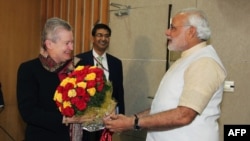NEW DELHI —
The U.S. Ambassador to India has met Indian opposition leader Narendra Modi, ending a near decade-long boycott of the man who is the frontrunner to be India’s next prime minister. The Hindu nationalist leader was denied a U.S. visa in 2005 over his role in sectarian violence which swept his state in 2002.
Television pictures showed U.S. Ambassador to India Nancy Powell and Bharatiya Janata Party leader Narendra Modi exchanging a cordial handshake before they sat down for discussions Thursday in Gandhinagar, the capital of Gujarat state headed by the Indian opposition leader.
Political analysts said the handshake was prompted by the possibility that Modi could head India’s next government. He is the prime ministerial candidate of the opposition B.J.P., which polls show could dislodge the Congress party in upcoming national elections, to be held by May.
The U.S. was among several countries which shunned the B.J.P. leader over allegations that he did not do enough to stop riots which swept through Gujarat in 2002 and killed nearly 1,000 people, mostly Muslims.
Modi denies the accusations. The Supreme Court has found no evidence to prosecute him.
As he grew in prominence on India’s national political stage in the last year, other countries and international bodies, including the European Union and Australia, restored ties with him.
Former Indian ambassador to the United States Lalit Mansingh said the U.S. was bound to follow suit.
“It would be quite embarrassing for the Americans not to recognize a democratically elected leader. One is not saying whether he will be elected or not, but it would lead to a peculiar situation, which I think the Americans were keen to avoid,” said Mansingh.
The U.S. revoked Modi’s visa in 2005 under a domestic law that bars foreign officials responsible for "severe violations of religious freedom.”
The thorny visa issue was apparently not discussed, but political analysts said the meeting signals that the U.S. would be willing to issue one.
The U.S. embassy did not comment. It called the meeting part of its outreach to senior leaders of India’s major political parties in advance of the upcoming elections. The embassy also pointed out that Ambassador Nancy Powell continues to emphasize that the U.S.-India partnership is important and strategic.
Political analysts think the long boycott of Modi by the U.S. is unlikely to damage ties between the two countries if the BJP were to come to power.
Mansingh pointed out that Modi has strong support from many people from his Gujarat state living in the United States, who want to see a strong relationship.
“The B.J.P. of all parties has a pretty strong network abroad, particularly in the United States, and there is a large thriving Gujarati community in the U.S., I take it most of them are B.J.P. supporters, so I don’t think this will have any impact on bilateral ties,” said Mansingh.
Throughout his election campaign, Modi has drawn huge crowds. He has sought to portray himself as a strong leader who can make India more economically vibrant and provide good governance in a country fed up with the many corruption scandals that have marred the Congress party-led government.
Television pictures showed U.S. Ambassador to India Nancy Powell and Bharatiya Janata Party leader Narendra Modi exchanging a cordial handshake before they sat down for discussions Thursday in Gandhinagar, the capital of Gujarat state headed by the Indian opposition leader.
Political analysts said the handshake was prompted by the possibility that Modi could head India’s next government. He is the prime ministerial candidate of the opposition B.J.P., which polls show could dislodge the Congress party in upcoming national elections, to be held by May.
The U.S. was among several countries which shunned the B.J.P. leader over allegations that he did not do enough to stop riots which swept through Gujarat in 2002 and killed nearly 1,000 people, mostly Muslims.
Modi denies the accusations. The Supreme Court has found no evidence to prosecute him.
As he grew in prominence on India’s national political stage in the last year, other countries and international bodies, including the European Union and Australia, restored ties with him.
Former Indian ambassador to the United States Lalit Mansingh said the U.S. was bound to follow suit.
“It would be quite embarrassing for the Americans not to recognize a democratically elected leader. One is not saying whether he will be elected or not, but it would lead to a peculiar situation, which I think the Americans were keen to avoid,” said Mansingh.
The U.S. revoked Modi’s visa in 2005 under a domestic law that bars foreign officials responsible for "severe violations of religious freedom.”
The thorny visa issue was apparently not discussed, but political analysts said the meeting signals that the U.S. would be willing to issue one.
The U.S. embassy did not comment. It called the meeting part of its outreach to senior leaders of India’s major political parties in advance of the upcoming elections. The embassy also pointed out that Ambassador Nancy Powell continues to emphasize that the U.S.-India partnership is important and strategic.
Political analysts think the long boycott of Modi by the U.S. is unlikely to damage ties between the two countries if the BJP were to come to power.
Mansingh pointed out that Modi has strong support from many people from his Gujarat state living in the United States, who want to see a strong relationship.
“The B.J.P. of all parties has a pretty strong network abroad, particularly in the United States, and there is a large thriving Gujarati community in the U.S., I take it most of them are B.J.P. supporters, so I don’t think this will have any impact on bilateral ties,” said Mansingh.
Throughout his election campaign, Modi has drawn huge crowds. He has sought to portray himself as a strong leader who can make India more economically vibrant and provide good governance in a country fed up with the many corruption scandals that have marred the Congress party-led government.










